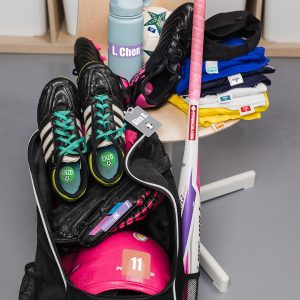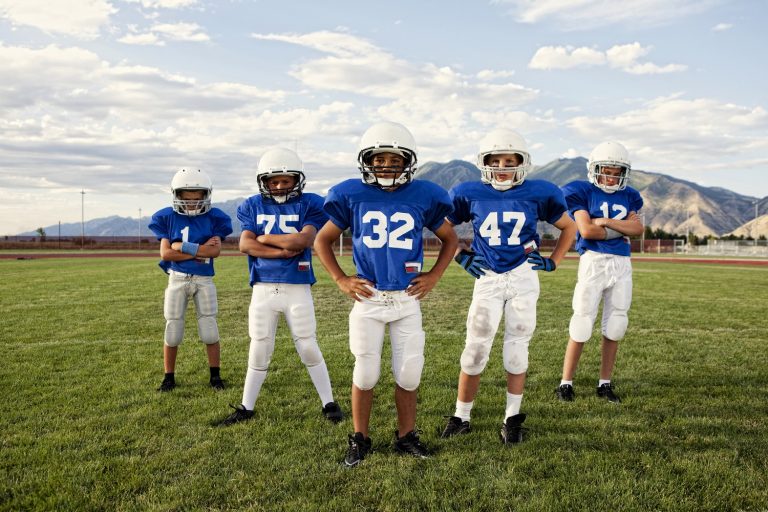Most kids give sports a try at some point in their childhood. If it takes, and they enjoy it and keep it up, it usually becomes a big part of the week for the whole family. Many parents who never considered themselves sporty suddenly find themselves soccer, hockey, or dance moms.
We’ve all heard the stories of dance moms (heck, there is a show about them!); it’s essential to remind yourself that your kids’ participation and enjoyment of a sport can depend on your attitude as a sports parent. Your attitude and character as sports parent also teach your child life-long skills, respect, good sportsmanship.
Being a good sports parent involves supporting and encouraging your child’s interest in sports while setting appropriate boundaries and expectations. Your job as parents includes providing transportation to practice and games, helping with equipment and uniforms, and being a positive role model by displaying sportsmanship.
Here are some things to keep in mind when you’re starting new sports:
Encourage your child to participate in various sports to find the one they enjoy the most.
Just because you love hockey doesn’t mean your child will too. So don’t push them into what you love. Instead, let them try a variety of sports, both team and individual and see what’s a good fit for them. Even Tom Brady had to figure this out! At a young age, even if they show a desire for one sport over all others, it’s still an excellent time to encourage them to try lots of things. Playing one sport can lead to burnout and losing interest in all sports. So at a young age, encouraging various sports and activities with an emphasis on moving their body and staying active makes you a good sports parent.
Provide support and encouragement, but don’t put too much pressure on your child to win or excel.
Always emphasize the reason they’re playing- to have fun and stay active. Winning is just a bonus that hard work can sometimes bring, but it isn’t everything. Focus on one day at a time. Good sports parents will ensure they focus on being their best that day. Not thinking ahead to winning championships, scholarships or the NFL that many parents convince themselves is in their future. Please your importance on the hard work they put in – today.
“…only 0.02 percent of hockey-playing boys in Ontario will make a ‘career’ out of hockey.”
This may seem discouraging or negative, but only if you look at the end goal this way. The end goal of kids in sports is a lifelong love of the game, life skills like dedication, hard work and a love for keeping an active lifestyle throughout life.
Support and celebrate, but don’t inflate their ego
Sure, you think your kid is the best on the team; maybe they are!? Or perhaps you’re biased?! Regardless, it’s important to praise and congratulate them but don’t inflate their ego. Don’t tell them they are the best or better than anyone in particular. Teammates don’t want to play with a cocky player, and coaches don’t appreciate this un-sportsman-like attitude. Coaches consider more than just skill when it comes to recruiting; the best player isn’t always who they’ll want on the team if it means dealing with poor team dynamics.
Attend your child’s games and practices, but don’t hover or coach from the sidelines.
You are not the coach; you are the parent. Therefore, your role is different (see this vital task, lol). Cheer from the sidelines, never say anything negative about other players, and avoid conflict with coaches.
Always be respectful of officials. Inevitably, somebody will make bad calls, and a ref may upset you, your kid, or the team – it’s still not your job to speak poorly about them. You can be disappointed, but never bad-mouth anyone. Good sports parents always manage their anger and set a good example for the team (players, coaches, parents – you likely all feel like family). So stay positive, show class, and never bad-mouth anyone.
Help your child balance their sports commitments with other responsibilities, such as schoolwork and family time.
You are the parent. This is your job. Helping your kids function in all aspects of their life is essential. They need to learn how to manage their time and responsibilities. Raising well-socialized, happy kids means allowing them time to be kids. Free time and time with friends are equally important for childhood development. Teaching your kids to be responsible adults means teaching them time management and the importance of finishing their homework and chores.
Speaking of organization- parents also need to make sure your kids in competitive sports are well labeled!

Celebrate your child’s successes and help them learn from their failures.
They will not always win; they’ll make mistakes and have bad days. That doesn’t make them a bad athlete, but how they react and deal with losses can make them a good team player and a well-rounded person. Tell them that failure happens; loss is hard but temporary. Remind them that you’re still really proud of them, and mention some great things that happened in the game or practice.
Allow them to have disappointment and feelings about it – but make sure they don’t dwell for too long. Remind them that there is always next week or next year. Losing happens. We must teach them to deal with it well.
Here are a few quick notes that should go without saying,
-If you can’t be at every game (that doesn’t make you a bad parent!), just tell them that you support them and are thinking of them.
-When you are at games, put your phone away.
-Talk and display appropriate behavior, like winning gracefully.
-Never, ever say anything discouraging, share thoughts or opinions on another player’s lack of skill
-Remember, they are just kids.
The key is to remember that your child’s participation in sports should be enjoyable and not overly stressful. Make sure to communicate with coaches and other parents to ensure your child’s experience is positive, as well as the team’s experience.

